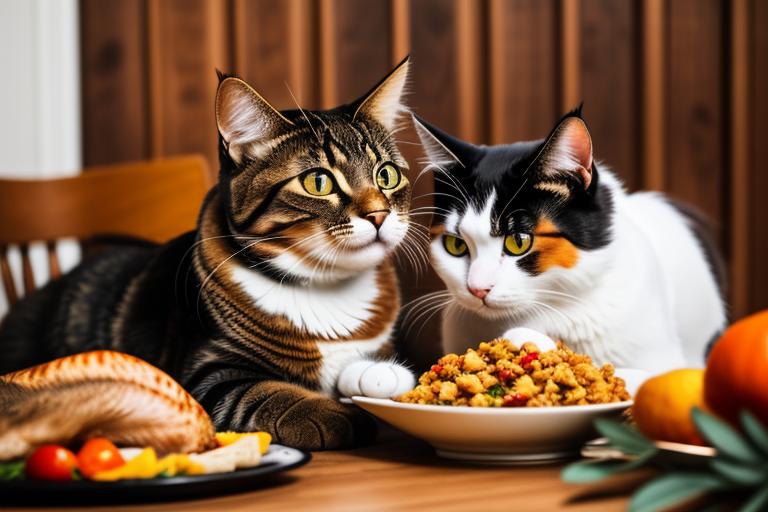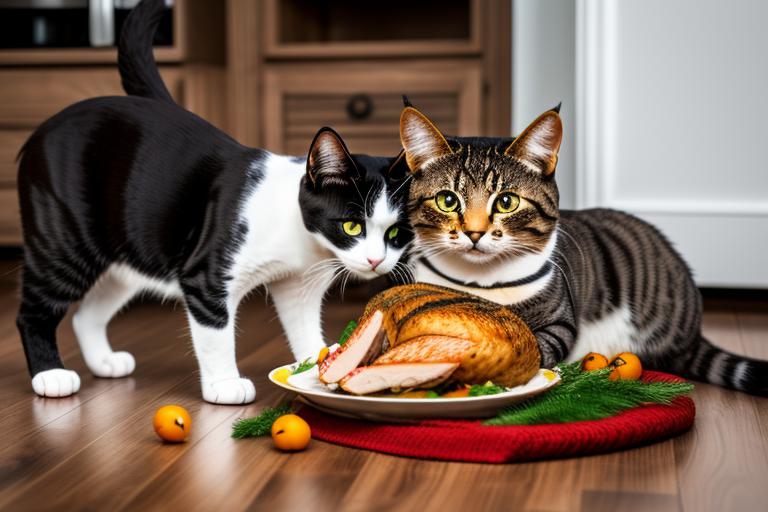Are you curious about whether cats can indulge in some Thanksgiving turkey? As a responsible pet owner, it’s important to consider the potential risks and benefits before sharing your feast with your feline companion.
While turkey can be a tasty treat for cats, there are certain precautions you need to take to ensure their health and well-being. So, before you reach for that carving knife, let’s explore the dos and don’ts of feeding turkey to your beloved kitty.
Potential Risks of Feeding Cats Turkey
Feeding your cat turkey can pose potential risks to their health. While turkey is a popular holiday treat for humans, it may not be as beneficial for our feline friends.
One of the main concerns when it comes to feeding cats turkey is the risk of food poisoning. Turkey can sometimes contain harmful bacteria like Salmonella or Campylobacter, which can cause severe gastrointestinal issues in cats. These bacteria can lead to symptoms like vomiting, diarrhea, and dehydration, potentially requiring veterinary intervention.
Additionally, turkey bones can be hazardous for cats. They can splinter and cause choking, blockages, or internal injuries if swallowed.
Another risk is the seasoning and preparation methods used when cooking turkey. Cats have sensitive digestive systems, and certain ingredients like garlic, onions, or excessive salt can be toxic to them. Furthermore, if the turkey is cooked with butter, oils, or other fatty substances, it can lead to pancreatitis in cats.
Nutritional Benefits of Turkey for Cats

While there are potential risks associated with feeding cats turkey, there are also some nutritional benefits to consider. Here are three reasons why turkey can be beneficial for your feline friend:
- Lean Protein: Turkey is a great source of lean protein, which is essential for your cat’s overall health. Protein helps support muscle growth, repair tissues, and maintain a healthy immune system. It also provides your cat with essential amino acids that can’t be produced by their bodies.
- Vitamins and Minerals: Turkey is rich in vitamins and minerals that are important for your cat’s wellbeing. It contains vitamin B6, niacin, phosphorus, and selenium, among others. These nutrients help support healthy bones, skin, and coat, as well as aid in energy metabolism.
- Low in Fat: Turkey is a relatively low-fat meat option, making it suitable for cats that need to watch their calorie intake. Feeding your cat lean turkey can help maintain a healthy weight and prevent obesity-related issues. However, it’s important to remember that moderation is key, as too much fat can still be harmful to your cat’s health.
Precautions to Take When Feeding Cats Turkey
Before offering turkey to your cat, it’s important to take certain precautions to ensure their safety and well-being. While turkey can be a tasty treat for cats, there are a few things you should keep in mind.
Firstly, make sure the turkey is fully cooked. Raw or undercooked turkey can contain harmful bacteria like salmonella, which can make your cat sick. Always ensure that the turkey is thoroughly cooked before giving any to your feline friend.
Secondly, remove the skin, bones, and excess fat from the turkey. The skin can be high in fat and may upset your cat’s stomach. Bones, especially small ones, can pose a choking hazard or cause damage to your cat’s digestive system. It’s best to stick to boneless, skinless pieces of turkey when feeding your cat.
Additionally, avoid seasoning the turkey with any spices or herbs. While these may enhance the flavor for humans, they can be harmful to cats. Certain seasonings, like onion and garlic, are toxic to cats and can lead to serious health issues.
Lastly, moderation is key. While turkey can be a delicious treat, it shouldn’t replace your cat’s regular diet. Too much turkey can upset their stomach or lead to weight gain.
Safe Ways to Include Turkey in Your Cat’s Diet
To safely incorporate turkey into your cat’s diet, there are a few steps you can take to ensure their health and enjoyment.
- Cooked, boneless turkey: When preparing turkey for your cat, make sure it’s thoroughly cooked and free of bones. Raw or undercooked turkey can contain harmful bacteria that may cause digestive issues or food poisoning. Additionally, bones can pose a choking hazard or cause damage to your cat’s digestive tract.
- Limited portions: While turkey can be a tasty treat for your cat, it should only be given in moderation. Too much turkey can upset your cat’s stomach and lead to weight gain. Stick to small, occasional servings and avoid adding any seasoning or spices, as they can be harmful to cats.
- Avoid fatty skin and gravy: Cats shouldn’t consume the fatty skin or gravy from turkey. Excessive fat can lead to pancreatitis, a serious condition that causes inflammation of the pancreas. It’s best to remove the skin and avoid adding gravy to your cat’s portion.
Alternatives to Turkey for Cats’ Thanksgiving Treats
If you’re looking for alternative Thanksgiving treats for your cat, there are plenty of options besides turkey. While turkey is a popular choice during the holiday season, it’s important to remember that not all cats can tolerate it well. Fortunately, there are various alternatives that you can consider to ensure your feline friend enjoys a delicious and safe Thanksgiving meal.
One alternative to turkey for cats is cooked chicken. Chicken is a lean protein that can be a tasty and nutritious option for your cat. Make sure to remove the skin, bones, and any seasoning before serving it to your cat.
Another option is canned tuna or salmon. These fish options are rich in omega-3 fatty acids, which can promote healthy skin and coat. However, it’s important to ensure that the fish is plain, without any added salt or seasonings.
If you’re looking for a plant-based option, pumpkin can be a great choice. Pumpkin isn’t only tasty but also has digestive benefits for cats. You can serve it plain or mix it with your cat’s regular food. Just make sure to use pure pumpkin, not pumpkin pie filling, as it may contain added sugars and spices.
Frequently Asked Questions
Yes, cats can eat the skin of turkey, but it’s best to avoid it. The skin is high in fat and can cause digestive issues for cats. Stick to feeding them lean, cooked turkey meat instead.
Feeding cats turkey bones can be risky. The bones may splinter and cause choking or internal injuries. It’s best to avoid giving your cat any bones to keep them safe and healthy.
Yes, cats can eat raw turkey. However, it is important to note that raw meat can carry harmful bacteria and parasites. It is recommended to consult with a veterinarian before introducing raw turkey into your cat’s diet.
When feeding cats turkey leftovers, there are a few precautions to take. Make sure the turkey is fully cooked and doesn’t contain any seasoning or bones. Also, avoid giving them large amounts to prevent digestive issues.
You can give your cat some alternative Thanksgiving treats besides turkey. Try cooked, plain chicken or canned pumpkin (not the pie filling). Just make sure to avoid any seasonings or ingredients that could be harmful to them.
Conclusion
In conclusion, cats can safely enjoy turkey as part of their diet, but it’s important to be aware of potential risks and take necessary precautions.
Turkey can provide various nutritional benefits for cats, but it should be given in moderation and without any seasoning or bones.
Always consult with a veterinarian before introducing new foods to your cat’s diet.
Remember to consider alternatives to turkey for cats’ Thanksgiving treats to ensure their safety and well-being.

